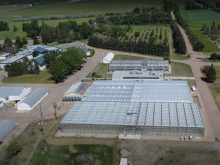Researchers say new generation co-ops are one way to help bolster the agricultural economy, so a pilot project is being introduced to foster growth of this co-op model.
The Centre for the Study of Co-operatives at the University of Saskatchewan will carry out the six-month project. It will try to make sure people have the skills needed to make new generation co-ops a success.
This model is defined as a value-added operation owned and operated by farmers for the purpose of processing and marketing agricultural products.
Read Also

Manitoba beekeepers battle for survival
Honeybee colony losses have hit 43 per cent, making 2025 the latest in a string of poor bee survival years for Manitoba’s honey producers
“It’s nothing new, it’s still a notion of farmers needing to get a hold of a bigger slice of the value chain and new generation co-ops are a convenient way of doing that,” said Roger Herman, project co-ordinator.
The federal government has provided $105,000 through the Canadian Adaptation for Rural Development program.
Herman said the project has two goals: to work with producer groups interested in the new generation co-op concept and to work with the professional community.
“We want to work with the legal community, accountants and the business development community and say ‘here’s a viable model coming down the pipe. You’re going to be approached by producer groups wanting to use this model, are you ready for them?’ “
Herman said, as it stands now, “those professional communities aren’t properly prepared or familiar with the model to be able to lend the kind of support that is required.”
This project is part of a larger initiative by the Canadian Co-operative Association to help co-ops deal with changes in the agricultural economy.
The new generation co-op model has been around for more than 10 years in the United States, with producers uniting to develop value-added agri-food ventures.
In Canada, there is only a handful of new generation co-ops, or NGCs.
One of them is the Egg Producers Co-op Ltd., based out of Winnipeg, that started a NGC in the fall of 1997.
“Part of the reason for using a new generation model is all the dividends that are realized go back to the shareholders,” said Jake Kasdorf, president of the co-op.
The co-op was started after egg producers in Manitoba were approached by U.S. processors to produce a pasteurized liquid egg product that isn’t available in Canada.
Kasdorf said the new generation model allows egg producers to profit not only from the original product, but also its manufacturing and marketing uses.
The most difficult part of creating a new generation co-op is that members have to put money up front to raise capital. For the Egg Producers Co-op, this meant losing some members, because not all could afford the initial payment.
“We started off with 120 members, but some couldn’t carry the input costs, so now there’s 115.”
Kasdorf said the business is still developing, “but I think the new generation co-op is definitely the way we want to go.”
Herman hopes the pilot project will foster more new generation co-ops like the Egg Producers Co-op.
“There is a recognition that the new generation co-op model offers some great potential for producers,” said Herman.














